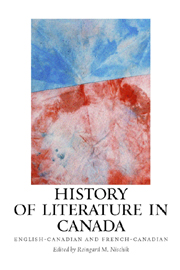Book contents
- Frontmatter
- Contents
- Acknowledgments
- Introduction: Writing a History of Literature in Canada
- I Beginnings
- II The Literature of New France, 1604–1760
- III The Literature of British Canada, 1763–1867
- 6 Historical Overview
- 7 English-Canadian Colonial Literature
- 8 French-Canadian Colonial Literature under the Union Jack
- IV From the Dominion to the Territorial Completion of the Nation, 1867–1918
- V The Modern Period, 1918–1967
- VI Literature from 1967 to the Present
- Further Reading
- Notes on the Contributors
- Index
8 - French-Canadian Colonial Literature under the Union Jack
from III - The Literature of British Canada, 1763–1867
Published online by Cambridge University Press: 12 September 2012
- Frontmatter
- Contents
- Acknowledgments
- Introduction: Writing a History of Literature in Canada
- I Beginnings
- II The Literature of New France, 1604–1760
- III The Literature of British Canada, 1763–1867
- 6 Historical Overview
- 7 English-Canadian Colonial Literature
- 8 French-Canadian Colonial Literature under the Union Jack
- IV From the Dominion to the Territorial Completion of the Nation, 1867–1918
- V The Modern Period, 1918–1967
- VI Literature from 1967 to the Present
- Further Reading
- Notes on the Contributors
- Index
Summary
OVER THE COURSE OF THE EIGHTEENTH CENTURY the alienation between Canada and France continued to grow. In Candide (1759), Voltaire (1614–1778) ironically dubbed the French colony “quelques arpents de neige.” On both sides of the Atlantic the French developed a sense of difference — geographically, culturally, linguistically, and psychosocially. The francophone Canadians began to consider themselves a “société distincte,” particularly with regard to the anglophone population on the North American continent. After the French Revolution, this sense of difference matured into self-confidence. 1758 (French victory at Carillon), 1760 (surrender of Montreal), and 1763 (Traité de Paris) constituted important caesuras in French Canada's historical consciousness. The events connected with these dates would not cease to be reviewed and rewritten in French-Canadian literature, essays, and chansons, for example by François-Réal Angers (“Chant patriotique du Canada,” 1838), Jacques Ferron (Les grands soleils, 1958), Félix Leclerc (Un soir de février, 1970), and Jean Bouthillette (Le Canadien français et son double, 1971).
Journalism
The end of the eighteenth and the beginning of the nineteenth century saw the emergence of a decisively patriotic littérature de combat, which fought to defend the rights granted by the British parliament in the Constitutional Act of 1791. This “combat literature” — later to be strongly criticized by intellectuals like Michel Bibaud (1782–1857) — was published in newspapers and journals, initially most of them anglophone; however, there were also bilingual journals such as The Quebec Gazette/La Gazette de Québec (1764), a particularly valuable source on Canadian culture in the eighteenth century.
- Type
- Chapter
- Information
- History of Literature in CanadaEnglish-Canadian and French-Canadian, pp. 88 - 110Publisher: Boydell & BrewerPrint publication year: 2008

